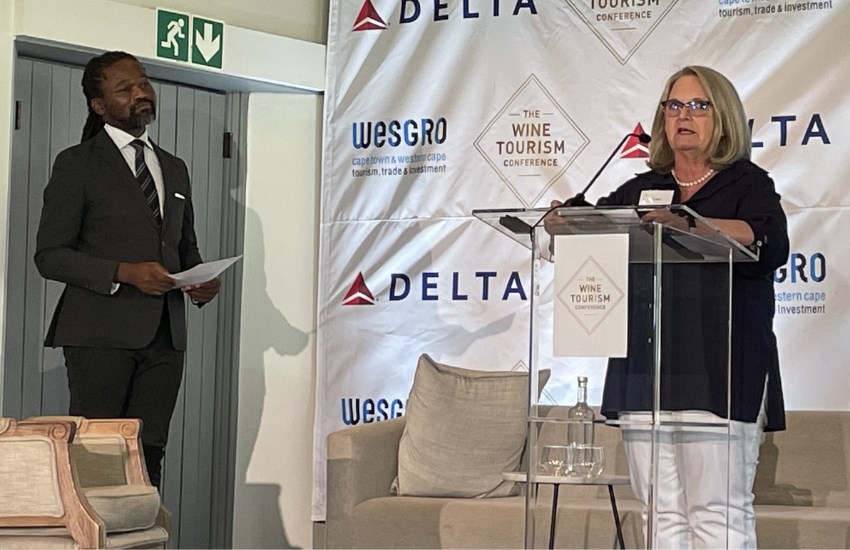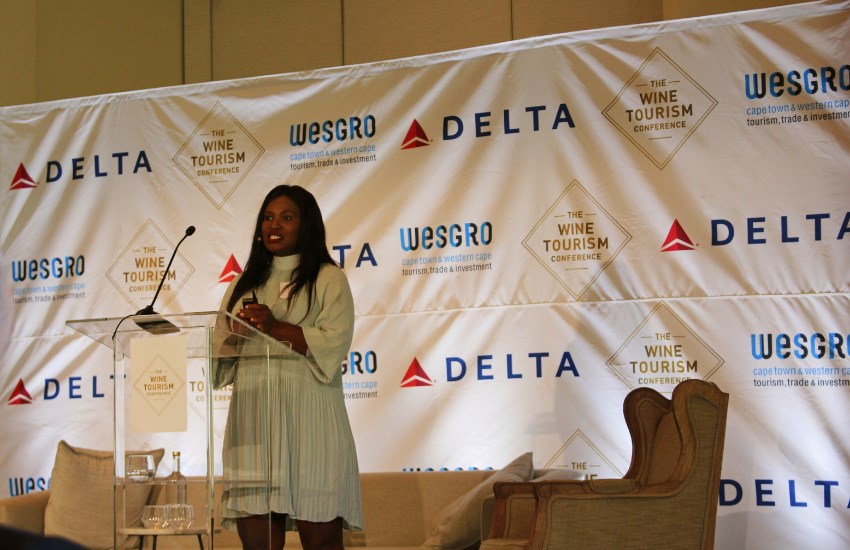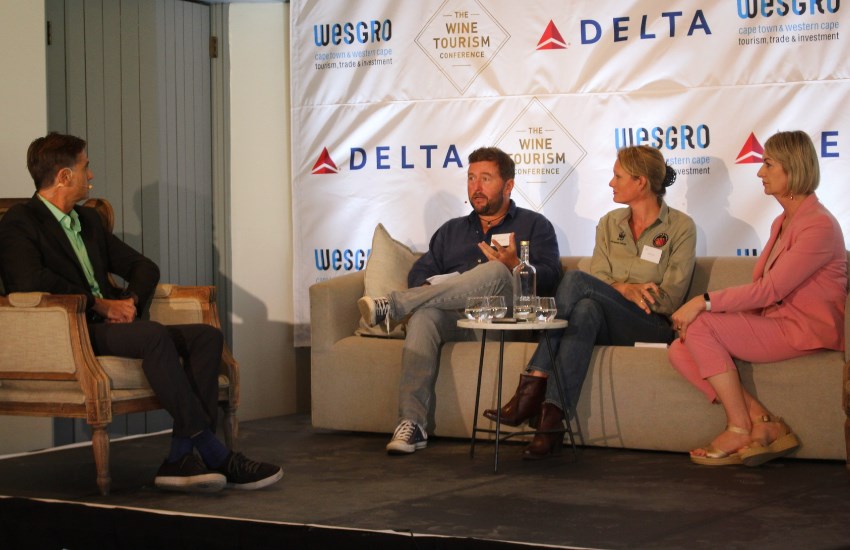
Programme director Africa Melane and conference convenor Margi Biggs
The sixth Wine Tourism Conference that took place on Wednesday 16 March 2022 at the Boschendal estate in Franschhoek saw outstanding international speakers share the platform with other leading local wine and tourism specialists. Its focus was on the value of wine tourism as a key tool for driving wine sales, with the accent on forging direct to consumer (DtC) relationships as a way of building future resilience.
The conference left the guests with renewed optimism about the future of wine tourism in South Africa. It also provided plenty of food for thought.
1. The importance of collaboration
Monika Iuel, WESGRO's chief marketing officer, delivered the opening address of the Wine Tourism Conference. She highlighted the importance of the wine industry standing together as one. "Collaborating is of more importance than ever before," she said, "We have to work together towards one goal as a unified industry."
One of the first speakers to take the stage was Joshin Raghubar, founder of iKineo Ventures, Adbot, and Explore Sideways. The Capetonian entrepreneur spoke about the idea of collaborating to create value and growth using innovative models and new technology.
He introduced his platform Explore Sideways by way of illustration. Explore Sideways is a luxury travel company specialising in exclusive, private tours and experiences to the curious and discerning traveller. Not only does the company serve South Africa, but it has also branched out to countries like Greece, Spain, and Patagonia.
Based on their findings, they made the decision to build a community of tour guides instead of simply creating a directory of tourist attractions. This shift, he explained, enabled them to make a positive impact on a bigger number of people in the industry, not just a select few.
2. Experiences do matter
Peter McAtamney, founder of Australia’s Wine Business Solutions, shared his findings around DtC wine business. He pointed out the importance of the experience linked to the wine brand. "Productise the experience," he advised.
Siwela Sweetness Masoga from Siwela Wines talked about wine tasting experiences for the new generation of wine drinker. One of the youngest black female winemakers, she recently opened an urban tasting room in Johannesburg. This space gives her the opportunity to interact with her customers and teach them about her wine.
To her, it is all about the experience: "Experiences do matter," she said. She explained how experiencing wine makes it more accessible to the consumer, enabling them to feel empowered.
"Educating our consumers about wine is just as important as selling it to them," she believes. "Most of the time, when I speak to people, they want to learn about wine."

Siwela Sweetness Masoga, owner and winemaker of Siwela Wines.
3. Invest in consumer-focused research
Data specialist and pioneer of wine e-commerce Paul Mabray went on to discuss how hospitality, subscription economy, and ecommerce are transforming the way we sell wine.
Mabray covered the importance of logistics, distribution, and processes in creating a positive user experience: “That calls for investment in consumer-focused research and user experience development, as well as in research and development of sales and marketing tools. Only then can the industry use its greatest asset, wine tourism.”
He highlighted significant e-commerce themes that could be helpful in getting to know your consumer. Most importantly, you have to "reach people where they are". Emails, in-market events, popups, and gifting are all ways in which wine brands can connect with their consumers directly.
He also stressed the importance of retaining customers. In fact, he said that "retention is better than acquisition". Although every customer is important, not every customer is as important.
4. Communication is key in differentiating your brand experience
The first panel discussion of the day centred around the topic of "How to differentiate your brand and customer experience". The panel was chaired by Jean-Pierre Rossouw, publisher of Rossouw’s Restaurants.
According to Mike Ratcliffe, Chair of Stellenbosch Wine Routes, digital communication is the answer. He explained that people want to be communicated with, be it via social media or email marketing.
Carolyn Martin from Creation echoed previous speakers like McAtamney and Masoga by emphasising the importance of the experience. She believes in investing in your team, as they're the one creating the experiences.
Shelly Fuller from WWF South Africa said that it is all about storytelling, "telling each and every story to create awareness". This, she continued, creates a butterfly effect.

JP Rossouw chairing a panel discussion featuring Mike Ratcliffe, Shelly Fuller, and Carolyn Martin.
5. SA wine tourism is an untapped resource for wine sales in Africa
Mac Mabidilala, the founder and CEO of Pengo Insight, touched on opportunities for South African wine in Sub-Saharan Africa. According to Mabidilala, Africa accounts for 16% of the world's population and 5% of the world's alcohol consumption. While that doesn't leave us with many wine drinkers, it does leave us with enormous scope. Although the wine market is often still illicit, informal and independent, the opportunity is there.
Read more: Tourism – creating sales for Africa
Overall, this year's conference was a great success. We look forward to seeing what next year's event will bring, once again organised by the brilliant Margi Biggs. To stay up to date and find out more about next year's Wine Tourism Conference, keep your eyes on their website: winetourism.co.za. You can also follow them on Facebook, Instagram, and Twitter.